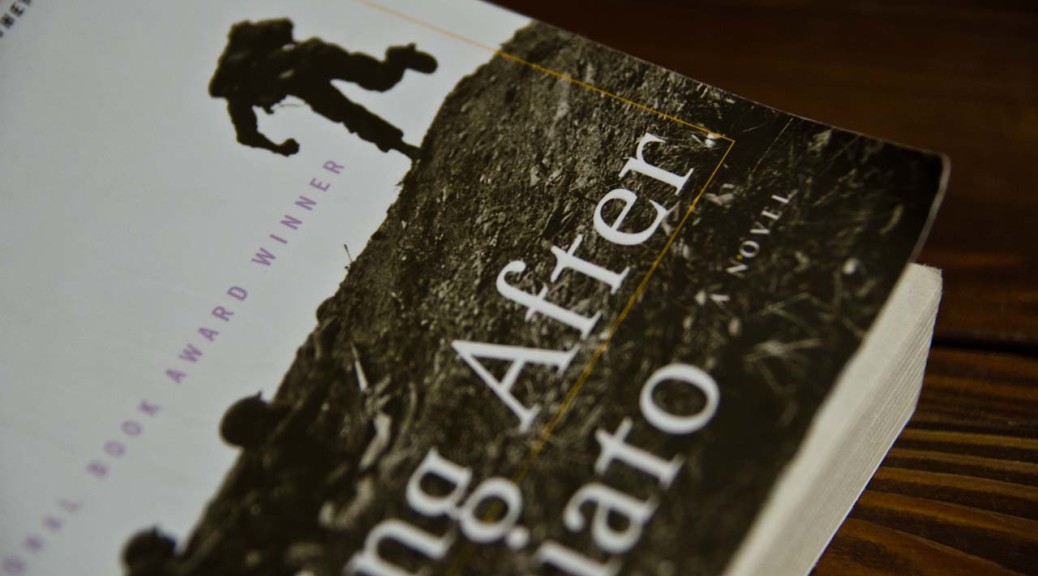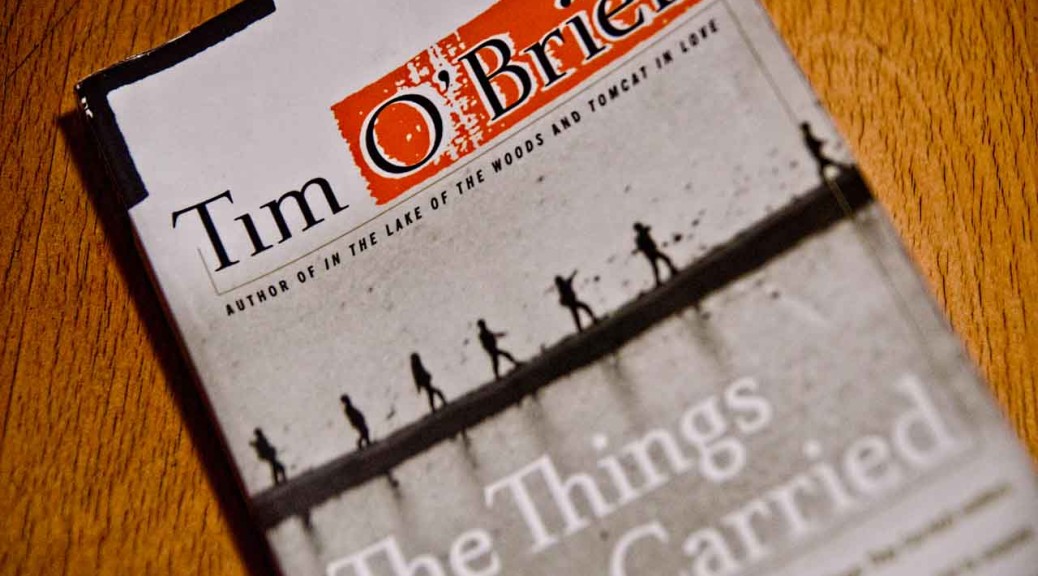
Tag Archives: TIm O’Brien


The Things They Carried
O’Brien, Tim. The Things They Carried. New York, N.Y.: Broadway Books, 1990. Print.
“He wondered how the tides and waves had come into play on that afternoon along the Jersey shoreline when Martha saw the pebble and bent down to rescue it from geology.” p8
“They would sit down or kneel, not facing the hole, listening to the ground beneath them, imagining cobwebs and ghosts, whatever was down there-the tunnel walls squeezing in” p. 10
“just sailing that big silver freedom bird over the mountains and oceans, over America, over the farms and great sleeping cities and cemeteries and highways” p. 23
“There were red checkers and black checkers. The playing field was laid out in a strict grid, no tunnels or mountains or jungles. You knew where you stood.” p. 32
“The old guy walked with a limp, slow and stooped over, but he knew where the safe spots were and where you had to be careful and where even if you were careful you could end up like popcorn.” p. 33
“Forty-three years old and I’m still writing war stories. My daughter Kathleen tells me it’s an obsession, that I should write about a little girl who finds a million dollars and spends it all on a Shetland pony.” p. 34
“That’s what stories are for. Stories are for joining the past to the future. Stories are for those late hours in the night when you can’t remember how you got from where you were to where you are. Stories are for eternity, when memory is erased, when there is nothing to remember except the story.” p. 38
“Courage, I seemed to think comes to us in finite quantities, like an inheritance, and by being frugal and stashing it away and letting it earn interest, we steadily increase our moral capital in preparation for that day when the account must be drawn down.” p. 40
USS Maddox at the Gulf of Tonkin. Tonkin Resolution.
Gulf of Tonkin incident
Rainy River, Minnesota/Ontario border.
“He was a witness, like God, or like the gods who look on in absolute silence as we live our lives, as we make our choices or fail to make them.” p. 60
“I was a coward. I went to the war.” p. 61
Chapter Enemies p.62-66
Chapter How to Tell a True War Story. 67-85
“A true war story is never moral. It does not instruct, nor encourage virtue, nor suggest models of proper human behavior, nor restrain men from doing the things men have always done. If a story seems moral, do not believe it.” p. 68
“Weird echoes and stuff. Like a radio or something, but it’s not a radio, it’s this strange gook music that comes right out of the rocks… They can’t get on the horn and call back to base and say, ‘Hey, listen, we need some firepower, we got to blow away this weirdo gook rock band.’ They can’t do that. It wouldn’t go down. So they lie there in the fog and keep their mouths shut.” p. 73
“The dark was coming on hard now, and off to the west I could see the mountains rising in silhouette, all the mysteries and unknowns.” p. 73
“It comes down to gut instinct. A true war story, if truly told, makes the stomach believe.” p. 78
On war: “It’s not pretty, exactly. It’s astonishing. It fills the eye. It commands you. You hate it, yes, but your eyes do not. Like a killer forest fire, like cancer under a microscope, any battle or bombing raid or artillery barrage has the aesthetic purity of absolute moral indifference–a powerful, implacable beauty–and a true war story will tell the truth about this, though the truth is ugly.” p. 81
“But what wakes me up twenty years later is Dave Jensen singing “Lemon Tree” as we threw down the parts.” p. 83
“Absolute occurrence is irrelevant. A thing may happen and be truer than total lie; another thing may not happen and be truer than the truth.” p. 83
“For Rat Kiley, I think facts were formed by sensation, not the other way around, and when you listened to one of his stories, you’d find yourself performing rapid calculations in your head, subtracting superlatives, figuring the square root of an absolute and then multiplying by maybe.” p89-90
Ruffs and Puffs: Regional Force / Popular Force
“The Greenies were not social animals. Animals, Rat said, but far from social.” p. 92
“Whenever he told the story, Rat had a tendency to stop now and then, interrupting the flow, inserting little clarifications or bits of analysis and personal opinion. It was a bad habit, Mitchell Sanders said, because all that matters is the raw material, the stuff itself, and you can’t clutter it up with your own half-baked commentary.” p. 106
“We all heard plenty of wackier stories. Some guy comes back from the bush, tells you he saw the Virgin Mary out there, she was riding a goddamn goose or something. Everybody buys it. Everybody smiles and asks how fast was they going, did she have spurs on.” p. 106
“And bones. Stacks of bones–all kinds. To one side, propped up against a wall, stood a poster in neat black lettering: ASSEMBLE YOUR OWN GOOK!! FREE SAMPLE KIT!!” p. 110
“But the grotesque part, he said, was her jewelry. At the girl’s throat was a necklace of human tongues. Elongated and narrow like pieces of blackened leather, the tongues were threaded along a length of copper wire, one overlapping the next, the tips curled upwards as if caught in a final shrill syllable.” p.110-111
“She had crossed to the other side. She was part of the land. She was wearing her culottes, her pink sweater, and a necklace of human tongues. She was dangerous. She was ready for the kill.” p. 116
Batangan Peninsula
“Sometimes, like that night in the shit field, the difference between courage and cowardice was something small and stupid.” p. 147
“Some of the men began shooting up flares. Red and green and silver flares, all colors, and the rain came down in Technicolor.” p. 148
“it occurred to me that the act of writing had led me through a swirl of memories that might otherwise have ended in paralysis or worse. By telling stories, you objectify your own experience. You separate it from yourself. You pin down certain truths. You make up others.” p. 158
“The rain made quick dents in the water, like tiny mouths, and the stink was everywhere.” p. 165
“The countryside itself seemed spooky–shadows and tunnels and incense burning in the dark. The land was haunted. We were fighting forces that did not obey the laws of twentieth-century science.” p. 202
“You don’t try to scare people in broad daylight. You wait. Because the darkness squeezes you inside yourself, you get cut off from the outside world, the imagination takes over.” p. 204
“It was a feeling VC must have. Like a puppeteer. Yank on the ropes, watch the silly wooden soldier jump and twitch.” p. 208
“The thing about a story is that you dream it as you tell it, hoping that others might then dream along with you, and in this way memory and imagination and language combine to make spirits in the head.” p. 230
The Man Who Never Was (film, dir. Ronald Neame, 1956) (Book by Lt. Cmdr. Ewen Montagu)
“But in a story I can steal her soul. I can revive, at least briefly, that which is absolute and unchanging.” p. 236
“We kept the dead alive with stories.” p. 239
There was a story for instance, about how Curt Lemon had gone truck-or-treating on Halloween. A dark, spooky night, and so Lemon put on a ghost mask and painted up his body all different colors and crept across a paddy to a sleeping village-almost stark naked, the story went, just boots and balls and an M-16-and in the dark Lemon went from hootch to hootch-ringing doorbells, he called it-and a few hours later, wen he slipped back into the perimeter, he had a whole sackful of goodies to share with his pals: candles and joss sticks and a pair of black pajamas and statuettes of the smiling Buddha.” p. 239
“To listen to the story, especially as Rat Kiley told it, you’d never know that Curt Lemon was dead. He was still out there in the dark, naked and painted up, trick-or-treating, sliding from hootch to hootch in that crazy white ghosts mask. But he was dead.” p. 240
**'”Well, right now,” she said, “I’m not dead. But when I am, it’s like … I don’t know, I guess it’s like being inside a book that nobody’s reading… An old one, It’s up on a library shelf, so you’re safe and everything, but the book hasn’t been checkout for a long, long time. All you can do is wait. Just hope somebody’ll pick it up and start reading.”‘ p. 245


